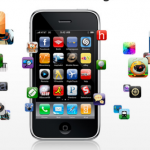With more than 90,000 people from various countries, the renowned trade-show held in the capital of Cataluña has become the undisputed destination for global innovation. This year’s edition of the Mobile World Congress included sophisticated mobile telephony, smart devices, and even connected accessories like bracelets and watches. Also showcased were trends in concepts that have had a huge influence on the tech scene, like wearables, big data, IoT (Internet of things), the cloud, and of course, robots and domestic “helpers”.
Without a doubt, the current Internet revolution is taking place via mobile devices. The most anticipated was from Samsung, and in two versions: the Galaxy S6 and S6 Edge – with curved edges that allow users to perform specific actions – a new evolution in design that could potentially earn it the candidacy for the best Smartphone of the year, even though the most inexpensive version starts at 699 euros.
However, other companies opted to introduce mobile models with lower prices – which although inexpensive, are still very innovative. Microsoft launched its two new models, the Lumia 640 and 640 XL, starting at 159 euros; Alcatel impressed attendees with its Idolo 3, a Smartphone that can be purchased for the entire family for the price of one unlocked iPhone; and finally, Blackberry captivated us with its new Salto, which now features a touchscreen keyboard and super-slim design, for the price of 275 euros.
The reason behind this shift is a transformation being accelerated by companies, who are choosing to offer less expensive devices and, consequently, creating equality of opportunity with regard to accessing mass data among all consumers.
Another trend was 5G, the network that will sustain and transmit the data volume an interconnected society will need. Although this edition of MWC doesn’t predict its arrival until 2020, some demonstration were able to be viewed.
For example, the SK Telekom robot designed by Ericsson, which responds to a human being’s movements in a synchronized way, due 5G’s transmission capabilities and connection speed.
In regard to the keynotes, most of the attention was enjoyed by, of course, Mark Zuckerberg (CEO of Facebook) and his presentation of Internet.org. The project’s objective is to take the internet to all corners of the world. This has encouraged mobile phone operators to begin to leave the current business model (based on messaging and calls), and invest in the project, because it is rentable and focused on data.
